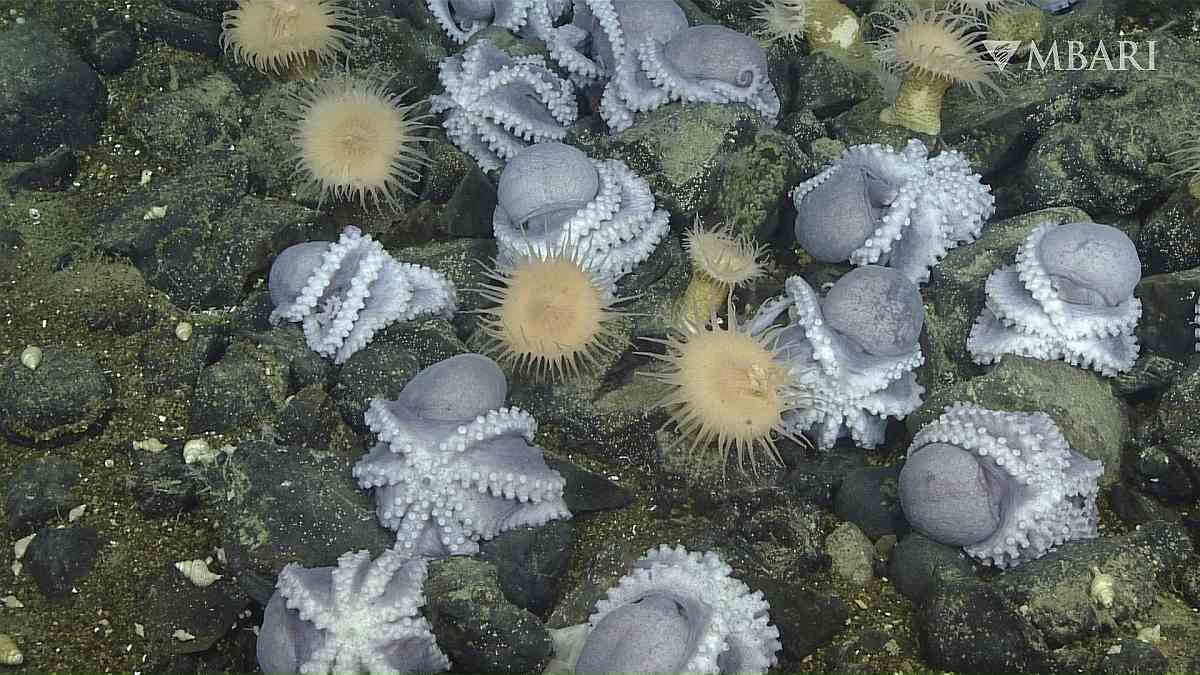
Female pearl octopuses nest at the “octopus garden” near the Davidson Seamount off the California coast at a depth of approximately 3,200 meters in this still photo from video taken in 2019.
17:33 JST, August 30, 2023
WASHINGTON (AP) — Most octopuses lead solitary lives. So scientists were startled to find thousands of the creatures huddled together, protecting their eggs at the bottom of the ocean off the central California coast.
Now researchers may have solved the mystery of why these pearl octopus congregate: Heat seeping up from the base of an extinct underwater volcano helps their eggs hatch faster.
“There are clear advantages of basically sitting in this natural hot tub,” said Janet Voight, an octopus biologist at the Field Museum of Natural History in Chicago and coauthor of the study, which was published Aug. 23 in Science Advances.
The researchers calculated that the heated nest location more than halved the time it took for eggs laid there to hatch — reducing the risk of being munched by snails, shrimp and other predators.
The nesting site, which the scientists dubbed an “octopus garden,” was first discovered in 2018 by researchers from the Monterey Bay National Marine Sanctuary and other institutions. The team used an underwater remote vehicle to film the throng of nearly 6,000 octopuses nesting 3.2 kilometers deep.
The eight-legged mollusks — each about the size of a grapefruit — perched over their eggs laid on rocks heated by water seeping up from the sea floor.
“It was completely incredible — we suddenly saw thousands of pearly-colored octopus, all upside down, with their legs up in the air and moving around. They were pushing away potential predators and turning over their eggs,” for an even flow of water and oxygen, said National Oceanic and Atmospheric Administration marine biologist Andrew DeVogelaere, a study coauthor.
Only the hazy shimmer of escaping hot water meeting the frigid sea alerted the researchers to the hydrothermal seep. But they still didn’t know exactly why the octopuses had gathered there.
For three years, scientists monitored the site to understand the hatching cycle, recording both the developmental stage of eggs at 31 nests and the inevitable deaths of octopus moms.
“After the hatchlings come out of the nest and swim off immediately into the dark, the mothers, who never left their nest and never appeared to feed during nesting, soon die,” said James Barry, a biologist at the Monterey institute and coauthor of the study.
The researchers found that eggs at this site hatch after about 21 months — far shorter than the four years or more it takes for other known deep-sea octopus eggs.
“Usually, colder water slows down metabolism and embryonic development and extends life span in the deep sea. But here in this spot, warmth appears to speed things up,” said Adi Khen, a marine biologist at the Scripps Institution of Oceanography, who was not involved in the study.
Mike Vecchione, a Smithsonian National Museum of Natural History zoologist who was not involved in the study, praised the researchers’ tenacity “to gather so much detailed data about such a remote location.”
Such octopus gardens “may be widespread and really important in the deep sea, and we just previously knew very little about them,” he said. “There’s still so much to discover in the deep sea.”
Top Articles in Science & Nature
-

Japan Institute to Use Domestic Commercial Optical Lattice Clock to Set Japan Standard Time
-

Japan to Face Shortfall of 3.39 Million Workers in AI, Robotics in 2040; Clerical Workers Seen to Be in Surplus
-

Record 700 Startups to Gather at SusHi Tech Tokyo in April; Event Will Center on Themes Like Artificial Intelligence and Robotics
-

iPS Treatments Pass Key Milestone, but Broader Applications Far from Guaranteed
-

iPS Cell Products for Parkinson’s, Heart Disease OK’d for Commercialization by Japan Health Ministry Panel
JN ACCESS RANKING
-

Japan PM Takaichi’s Cabinet Resigns en Masse
-

Japan Institute to Use Domestic Commercial Optical Lattice Clock to Set Japan Standard Time
-

Israeli Ambassador to Japan Speaks about Japan’s Role in the Reconstruction of Gaza
-

Man Infected with Measles Reportedly Dined at Restaurant in Tokyo Station
-

Videos Plagiarized, Reposted with False Subtitles Claiming ‘Ryukyu Belongs to China’; Anti-China False Information Also Posted in Japan





















